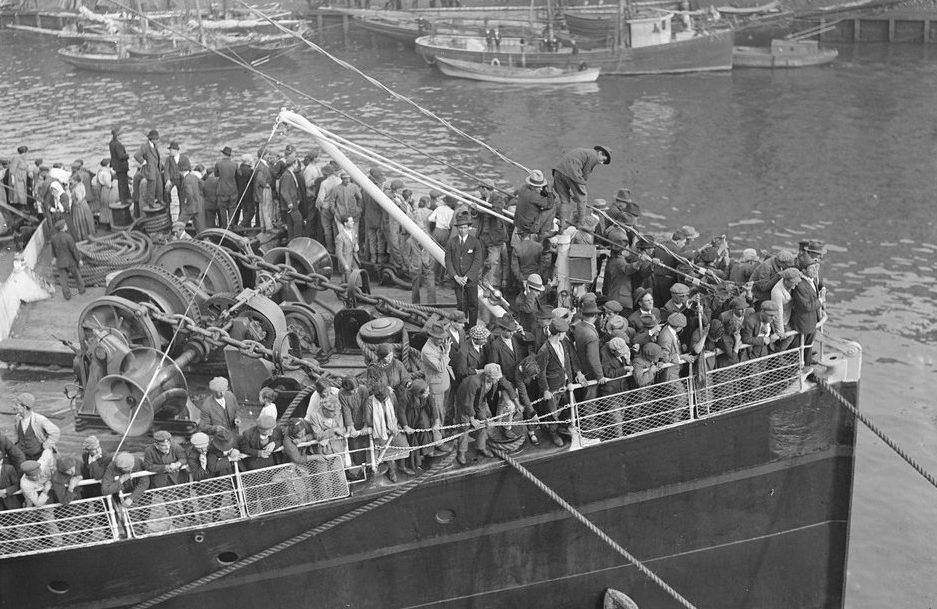Portugal's Changing Immigration Policy: A Shift In Approach?

Table of Contents
Recent Amendments to Portugal's Golden Visa Program
Portugal's Golden Visa program, once lauded for its relatively accessible pathway to residency, has undergone substantial revisions in recent years. These changes reflect a broader shift in Portugal's immigration policy, moving away from solely attracting high-net-worth individuals and towards a more balanced approach. The government's stated goal is to attract investment that benefits the entire country, not just specific regions.
- Specific changes in investment thresholds: The minimum investment requirements have been increased, particularly for real estate investments in urban areas.
- New restrictions on investment locations: Investment is now restricted in certain high-demand areas, aiming to curb rising property prices and promote more balanced regional development. Investment is now encouraged in less populated areas of the country.
- Impact on high-net-worth individuals' immigration choices: These restrictions have made obtaining a Golden Visa in Portugal more challenging, potentially impacting the number of high-net-worth individuals choosing Portugal as their destination.
- Government's stated goals behind the changes: The government aims to attract higher-quality investment and to distribute economic benefits more evenly across the country.
The impact of these changes is visible in the declining number of Golden Visa applications and approvals. This reduction signals a significant shift in Portugal's strategy towards a more selective and sustainable immigration model. The future of Portugal's Golden Visa program lies in its ability to adapt and attract investments that align with national development priorities.
Focus on Skilled Workers and the D7 Visa
Alongside the changes to the Golden Visa program, Portugal's immigration policy is increasingly focused on attracting skilled workers. The D7 Visa has become particularly popular, offering a pathway to residency for passive income earners, retirees, and those with remote working capabilities. This reflects a strategic shift towards attracting individuals who can contribute to the economy without necessarily requiring direct employment.
- Requirements for the D7 Visa: Applicants need to demonstrate a consistent source of passive income, such as rental income, pensions, or dividends.
- Advantages of the D7 Visa for specific demographics: The D7 Visa is attractive to those seeking a lifestyle change, allowing them to live in Portugal while maintaining their income streams from abroad.
- Future potential changes to the D7 Visa: While currently popular, the future may see adjustments to the D7 Visa requirements to better align with Portugal's overall economic and social goals.
- Comparison of D7 Visa with other skilled worker visas: The D7 Visa offers a different pathway compared to skilled worker visas that focus on specific job offers and employment contracts.
The D7 Visa complements other skilled worker visas, providing a diversified approach to attracting foreign talent and contributing to the Portuguese economy. This balanced approach strengthens Portugal's position as a destination for both skilled workers and individuals seeking a more relaxed lifestyle.
Integration Policies and Support for Immigrants
Portugal's commitment to successful immigration extends beyond visa programs; it also includes robust integration policies. The government provides various support systems to help new immigrants adapt to their new environment. However, challenges remain in ensuring the effectiveness of these integration programs.
- Examples of government-funded integration programs: These include language courses, job training initiatives, and cultural orientation programs.
- Challenges faced by immigrants in integrating into Portuguese society: Language barriers, cultural differences, and navigating bureaucratic processes can pose significant obstacles.
- Success stories and best practices in immigrant integration: Sharing success stories and best practices is essential to showcase the positive impact of integration efforts.
- Potential areas for improvement in integration policies: Further investment in community outreach programs and streamlined bureaucratic processes could greatly enhance integration.
Effective integration is crucial for the long-term success of Portugal's immigration policy. By investing in comprehensive support systems, Portugal can foster a welcoming and inclusive environment that benefits both immigrants and Portuguese society.
The Economic Impact of Portugal's Changing Immigration Policy
The economic impact of Portugal's evolving immigration policy is multifaceted. While the previous Golden Visa program contributed significantly to investment and economic growth, the revised policy aims for a more sustainable and evenly distributed economic benefit.
- Contribution of immigrants to specific sectors of the Portuguese economy: Immigrants contribute significantly to various sectors, including tourism, agriculture, and technology.
- Impact on tax revenue and GDP: Immigration boosts tax revenues and contributes positively to Portugal's overall GDP.
- Addressing concerns about potential strain on public services: Concerns about strain on public services need to be addressed through careful planning and investment in infrastructure.
- Long-term economic projections considering immigration trends: Sustainable immigration policies are crucial for long-term economic growth and prosperity.
The overall economic impact of Portugal's changing immigration policy requires ongoing monitoring and evaluation. A balanced approach, combining investment attraction with skilled worker programs and effective integration policies, is key to maximizing the benefits for both immigrants and the Portuguese economy.
Conclusion
Portugal's immigration policy is undergoing a significant shift, moving from a focus solely on attracting high-net-worth individuals through the Golden Visa program to a more balanced approach that prioritizes skilled workers and sustainable economic growth. These changes impact immigrants, businesses, and the Portuguese government alike. Understanding Portugal's changing immigration policy is crucial for anyone considering relocating. Explore the different visa options and learn more about how you can benefit from this evolving landscape. The future success of Portugal's immigration policy hinges on a continuing commitment to fair and effective policies that integrate newcomers while driving sustainable economic development.

Featured Posts
-
 A Small Snow White Birthday Party Spain Event Analysis
May 14, 2025
A Small Snow White Birthday Party Spain Event Analysis
May 14, 2025 -
 Friday 7 Pm Et Your Daily Dose Of Top Company News
May 14, 2025
Friday 7 Pm Et Your Daily Dose Of Top Company News
May 14, 2025 -
 Franca Reconhece Injustica Historica Da Divida Haitiana
May 14, 2025
Franca Reconhece Injustica Historica Da Divida Haitiana
May 14, 2025 -
 54 Miljoonaa Euroa Eurojackpotin Ennaetyksellinen Potti
May 14, 2025
54 Miljoonaa Euroa Eurojackpotin Ennaetyksellinen Potti
May 14, 2025 -
 Refus De Kohler Coquerel Porte Plainte Apres L Echec De L Audition A La Commission D Enquete Sur Le Budget
May 14, 2025
Refus De Kohler Coquerel Porte Plainte Apres L Echec De L Audition A La Commission D Enquete Sur Le Budget
May 14, 2025
